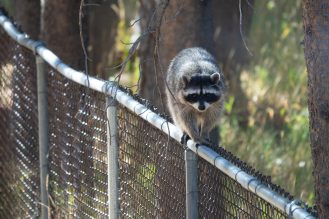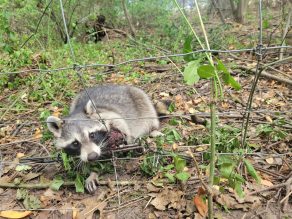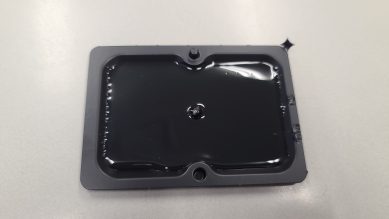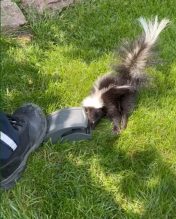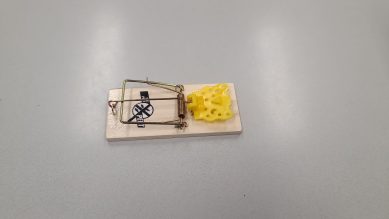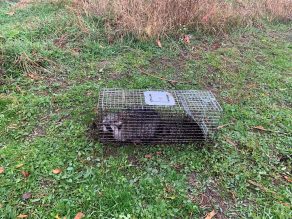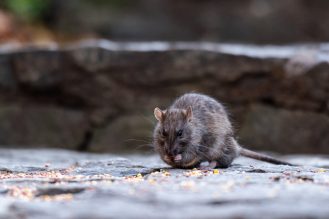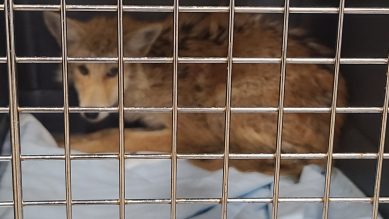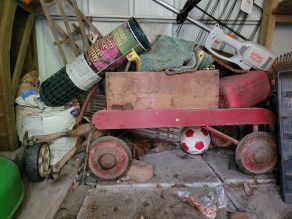Animal issues? Traps aren’t the answer
Don’t take matters into your own hands regarding wildlife
City services | August 6, 2024
It’s normal for wildlife to roam around neighbourhoods, public spaces, parks, and often people’s backyards. They’ve been known to make homes on residential properties in places like attics, chimneys, behind sheds, or under decks and porches. While having wildlife on your property or near your home might be a nuisance, it’s important to remember that these animals are wild and are simply in search of food and shelter.
Wildlife issues
If you have wildlife issues on your property, there are humane ways to manage the problem. Mississauga Animal Services would like to remind residents not to trap or relocate wildlife if they find them living in and around their homes.
While it may seem like a good idea, trapping or relocating wildlife can be harmful to the animal and its habitat and is not an effective long-term solution .
Traps
Traps, like glue traps, are inhumane. They are illegal under the Fish and Wildlife Conservation Act and aren’t permitted under the City’s Parks by-law. While anyone can purchase a trap, they can only be legally used under particular regulations within the Fish and Wildlife Conservation Act, which is enforced by the Ministry of Natural Resources.
Trapping can hurt or kill not only targeted animals but also unintended ones like birds, chipmunks, mice, and squirrels. They can accidentally get caught in the trap get injured and die.
Body-gripping trap
The outdoor use of body-hold traps is prohibited in Mississauga. Animals caught in body-gripping traps can suffer injury or death. These traps can also severely injure people.
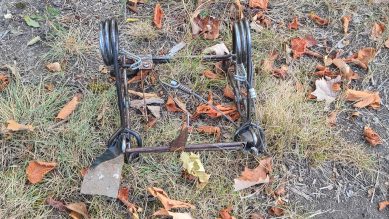 s
s
Glue trap
The outdoor use of glue traps is prohibited. Glue traps can injure or kill ensnared animals and non-target animals such as birds.
Snap trap
These types of traps are only to be used indoors as they can harm wildlife, including raccoons, skunks and squirrels. Ensure someone is home and monitoring snap traps to prevent any unintended injury.
Live-release trap
The outdoor use of live-release traps is permitted. Live trap users are required to constantly monitor them to ensure that only the targeted nuisance wildlife is trapped.
Rat poison & other rodenticides
Rat poison and rodenticides are pest control products for controlling mice, rats, and other rodents. Only licensed pest control companies can use outdoor rodenticides. Children, pets, and other wildlife could be at risk of severe poisoning from rodenticides used outdoors, so extra caution should be taken. Mississauga Animal Services recommends the use of enclosed bait stations, as they prevents rodenticide-infected rodents from being exposed/dying in gardens or encountering other wildlife, pets, and people.
Relocating wildlife
Besides trapping, it’s also illegal to move animals more than one kilometre away from where they were caught, according to the Fish and Wildlife Conservation Act. Studies have shown that many relocated animals die when placed in an unfamiliar environment.
When an animal leaves a neighbourhood, it opens a spot for other animals to come in and take over the available resources like food and shelter. Trying to control animal populations by moving them elsewhere doesn’t reduce their numbers, as other animals will start taking over the area. Relocation has also been linked to the spread of diseases like rabies.
Protect your home from wildlife
You can keep wildlife away from your property by taking simple steps to reduce or eliminate the availability of food, water, and shelter.
Wildlife removal companies
When choosing a wildlife removal company, consider the following:
- Insist on humane techniques such as reuniting wildlife families
- Ask for an inspection and written estimate
- Look out for unethical fees and practices
- Get specifics on how the issue and the animals will be handled
- Prevent the problem from happening again
- Get referrals from a trusted source and read reviews
- Make sure the Workplace Safety and Insurance Board insures them
Mississauga’s animals are a big part of what makes the city unique. By learning about them and treating them right, we can ensure they’re here for a long time. Helping with conservation and supporting green spaces are great ways to keep our animal neighbours safe. To learn more about wildlife in Mississauga, visit mississauga.ca/wildlife.
As a reminder, Mississauga Animal Services is here to assist with urgent animal rescues and to investigate any issues about animal welfare, dog bites, or answer any questions you might have about wildlife and pets. If you find an animal hurt, in danger, or behaving aggressively towards people or other pets, please call 905-896-5858.
Additional resources
Protect your home from wildlife
Reminder to keep wildlife wild
Exploring Mississauga’s wildlife: ways to help and protect
Tags
Media contact
City of Mississauga Media Relations
media@mississauga.ca
905-615-3200, ext. 5232
TTY: 905-896-5151
